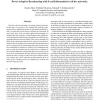Free Online Productivity Tools
i2Speak
i2Symbol
i2OCR
iTex2Img
iWeb2Print
iWeb2Shot
i2Type
iPdf2Split
iPdf2Merge
i2Bopomofo
i2Arabic
i2Style
i2Image
i2PDF
iLatex2Rtf
Sci2ools
ICNP
2003
IEEE
2003
IEEE
Power Adaptive Broadcasting with Local Information in Ad Hoc Networks
Network wide broadcasting is an energy intensive function. In this paper we propose a new method that performs transmission power adaptations based on information available locally, to reduce the overall energy consumed per broadcast. In most of the prior work on energy efficient broadcasting it is assumed that the originator of the broadcast has global network information (both topology information as well as the geographical distance between nodes). This can be prohibitive in terms of the consumed overhead. In our protocol, each node attempts to tune its transmit power based on local information (of up to two hops from the transmitting node). We perform extensive simulations to evaluate our protocol. Our simulations take into account the possible loss of packets due to collision effects and the additional re-broadcasts that are necessary due to lower power transmissions. We show that our protocol achieves almost the same coverage as other non power-adaptive broadcast schemes but wi...
Energy Intensive Function | ICNP 2003 | Network Protocols | Network Wide Broadcasting | Transmission Power Adaptations |
Related Content
| Added | 04 Jul 2010 |
| Updated | 04 Jul 2010 |
| Type | Conference |
| Year | 2003 |
| Where | ICNP |
| Authors | Xiaohu Chen, Michalis Faloutsos, Srikanth V. Krishnamurthy |
Comments (0)

